MGBBT1TEN - Sustainable Tourism: Environment, Industry & Development
VerifiedAdded on 2023/06/07
|9
|2532
|101
Report
AI Summary
This report provides a comprehensive analysis of sustainable tourism, focusing on the concepts, principles, and factors influencing its development within the tourism industry. It defines sustainable tourism, emphasizes the importance of balancing economic, societal, and environmental issues, and highlights principles such as resource preservation, cultural respect, and local economic support. The report identifies key stakeholders, including local communities, government entities, tourism establishments, and tourists, and discusses their roles in decision-making for sustainable tourism development. It examines macro-environmental factors like climate change, green policies, disruptive forces, and income inequality, and micro-environmental factors such as competition and tourist motivations, offering strategies for promoting sustainable practices and enhancing the tourism experience. The report concludes by underscoring the significance of sustainable tourism for economic growth, employment, and the overall well-being of both tourists and host communities.
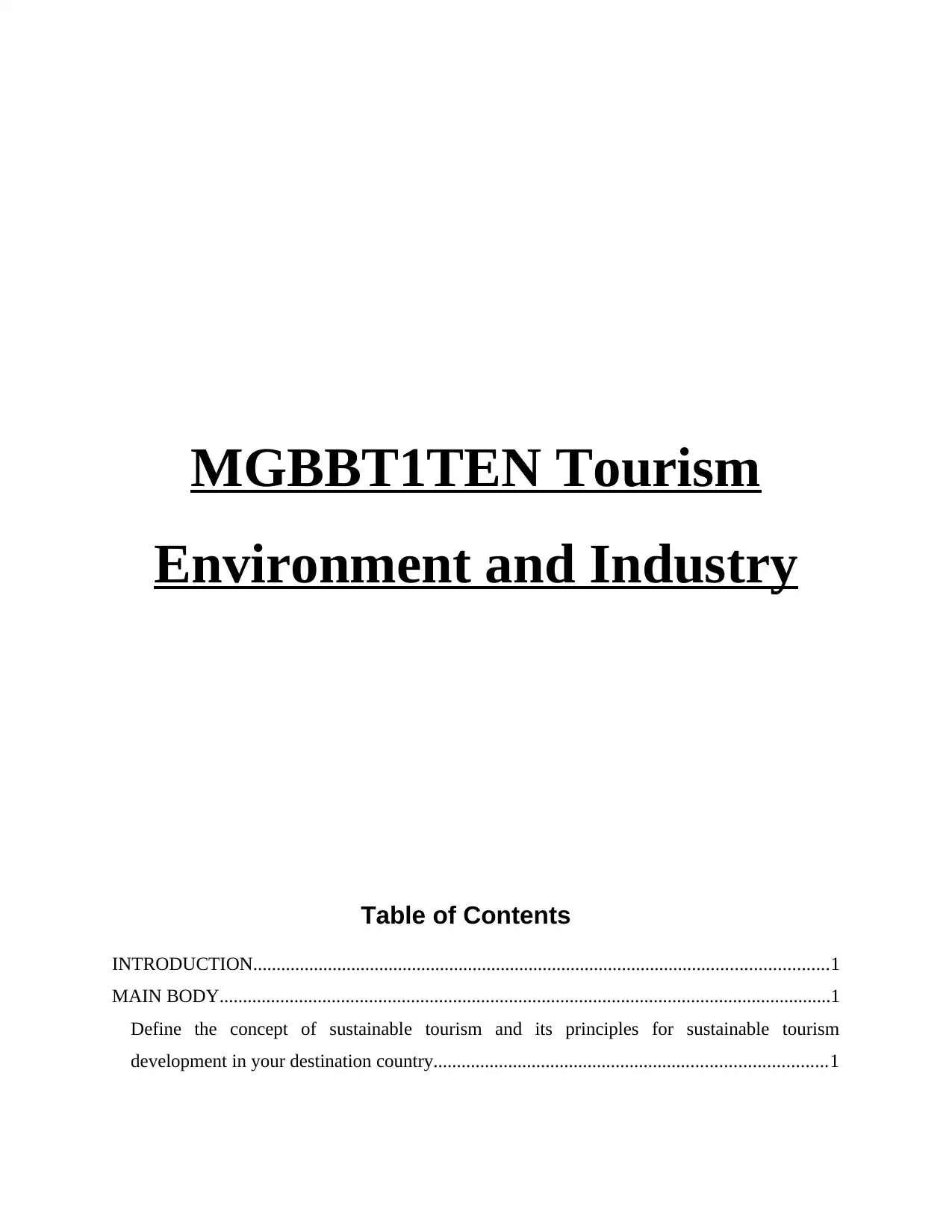
MGBBT1TEN Tourism
Environment and Industry
Table of Contents
INTRODUCTION...........................................................................................................................1
MAIN BODY...................................................................................................................................1
Define the concept of sustainable tourism and its principles for sustainable tourism
development in your destination country....................................................................................1
Environment and Industry
Table of Contents
INTRODUCTION...........................................................................................................................1
MAIN BODY...................................................................................................................................1
Define the concept of sustainable tourism and its principles for sustainable tourism
development in your destination country....................................................................................1
Paraphrase This Document
Need a fresh take? Get an instant paraphrase of this document with our AI Paraphraser
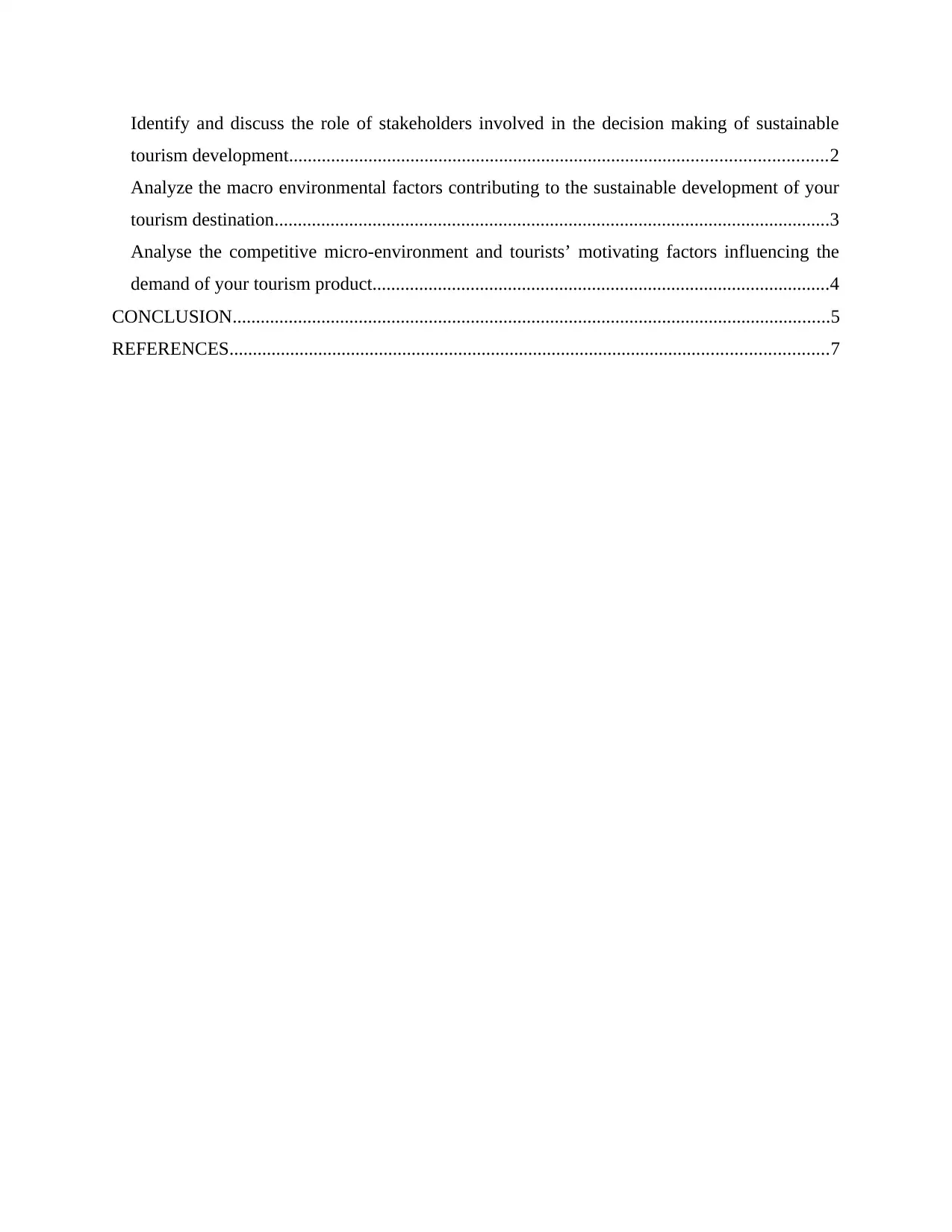
Identify and discuss the role of stakeholders involved in the decision making of sustainable
tourism development...................................................................................................................2
Analyze the macro environmental factors contributing to the sustainable development of your
tourism destination.......................................................................................................................3
Analyse the competitive micro-environment and tourists’ motivating factors influencing the
demand of your tourism product..................................................................................................4
CONCLUSION................................................................................................................................5
REFERENCES................................................................................................................................7
tourism development...................................................................................................................2
Analyze the macro environmental factors contributing to the sustainable development of your
tourism destination.......................................................................................................................3
Analyse the competitive micro-environment and tourists’ motivating factors influencing the
demand of your tourism product..................................................................................................4
CONCLUSION................................................................................................................................5
REFERENCES................................................................................................................................7
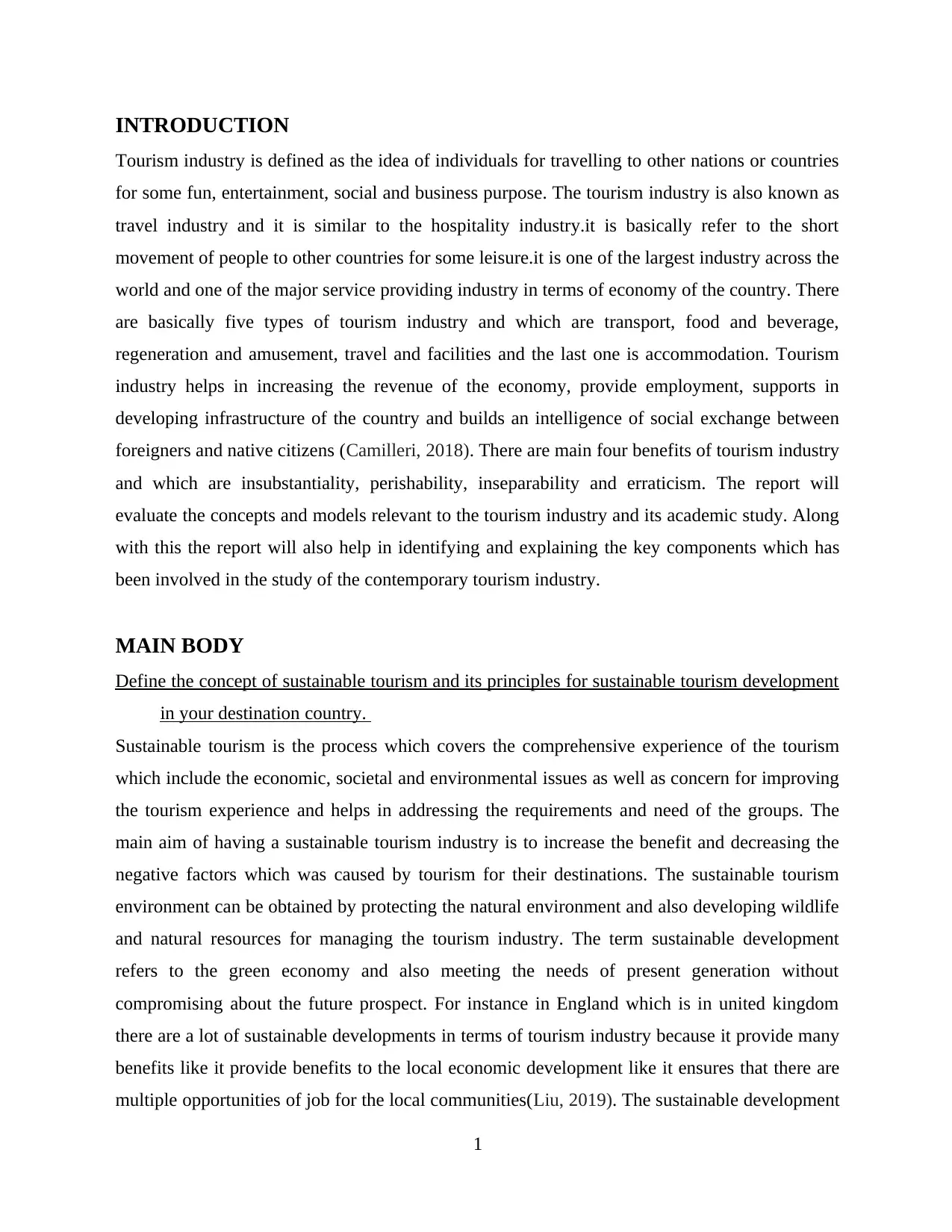
INTRODUCTION
Tourism industry is defined as the idea of individuals for travelling to other nations or countries
for some fun, entertainment, social and business purpose. The tourism industry is also known as
travel industry and it is similar to the hospitality industry.it is basically refer to the short
movement of people to other countries for some leisure.it is one of the largest industry across the
world and one of the major service providing industry in terms of economy of the country. There
are basically five types of tourism industry and which are transport, food and beverage,
regeneration and amusement, travel and facilities and the last one is accommodation. Tourism
industry helps in increasing the revenue of the economy, provide employment, supports in
developing infrastructure of the country and builds an intelligence of social exchange between
foreigners and native citizens (Camilleri, 2018). There are main four benefits of tourism industry
and which are insubstantiality, perishability, inseparability and erraticism. The report will
evaluate the concepts and models relevant to the tourism industry and its academic study. Along
with this the report will also help in identifying and explaining the key components which has
been involved in the study of the contemporary tourism industry.
MAIN BODY
Define the concept of sustainable tourism and its principles for sustainable tourism development
in your destination country.
Sustainable tourism is the process which covers the comprehensive experience of the tourism
which include the economic, societal and environmental issues as well as concern for improving
the tourism experience and helps in addressing the requirements and need of the groups. The
main aim of having a sustainable tourism industry is to increase the benefit and decreasing the
negative factors which was caused by tourism for their destinations. The sustainable tourism
environment can be obtained by protecting the natural environment and also developing wildlife
and natural resources for managing the tourism industry. The term sustainable development
refers to the green economy and also meeting the needs of present generation without
compromising about the future prospect. For instance in England which is in united kingdom
there are a lot of sustainable developments in terms of tourism industry because it provide many
benefits like it provide benefits to the local economic development like it ensures that there are
multiple opportunities of job for the local communities(Liu, 2019). The sustainable development
1
Tourism industry is defined as the idea of individuals for travelling to other nations or countries
for some fun, entertainment, social and business purpose. The tourism industry is also known as
travel industry and it is similar to the hospitality industry.it is basically refer to the short
movement of people to other countries for some leisure.it is one of the largest industry across the
world and one of the major service providing industry in terms of economy of the country. There
are basically five types of tourism industry and which are transport, food and beverage,
regeneration and amusement, travel and facilities and the last one is accommodation. Tourism
industry helps in increasing the revenue of the economy, provide employment, supports in
developing infrastructure of the country and builds an intelligence of social exchange between
foreigners and native citizens (Camilleri, 2018). There are main four benefits of tourism industry
and which are insubstantiality, perishability, inseparability and erraticism. The report will
evaluate the concepts and models relevant to the tourism industry and its academic study. Along
with this the report will also help in identifying and explaining the key components which has
been involved in the study of the contemporary tourism industry.
MAIN BODY
Define the concept of sustainable tourism and its principles for sustainable tourism development
in your destination country.
Sustainable tourism is the process which covers the comprehensive experience of the tourism
which include the economic, societal and environmental issues as well as concern for improving
the tourism experience and helps in addressing the requirements and need of the groups. The
main aim of having a sustainable tourism industry is to increase the benefit and decreasing the
negative factors which was caused by tourism for their destinations. The sustainable tourism
environment can be obtained by protecting the natural environment and also developing wildlife
and natural resources for managing the tourism industry. The term sustainable development
refers to the green economy and also meeting the needs of present generation without
compromising about the future prospect. For instance in England which is in united kingdom
there are a lot of sustainable developments in terms of tourism industry because it provide many
benefits like it provide benefits to the local economic development like it ensures that there are
multiple opportunities of job for the local communities(Liu, 2019). The sustainable development
1
⊘ This is a preview!⊘
Do you want full access?
Subscribe today to unlock all pages.

Trusted by 1+ million students worldwide
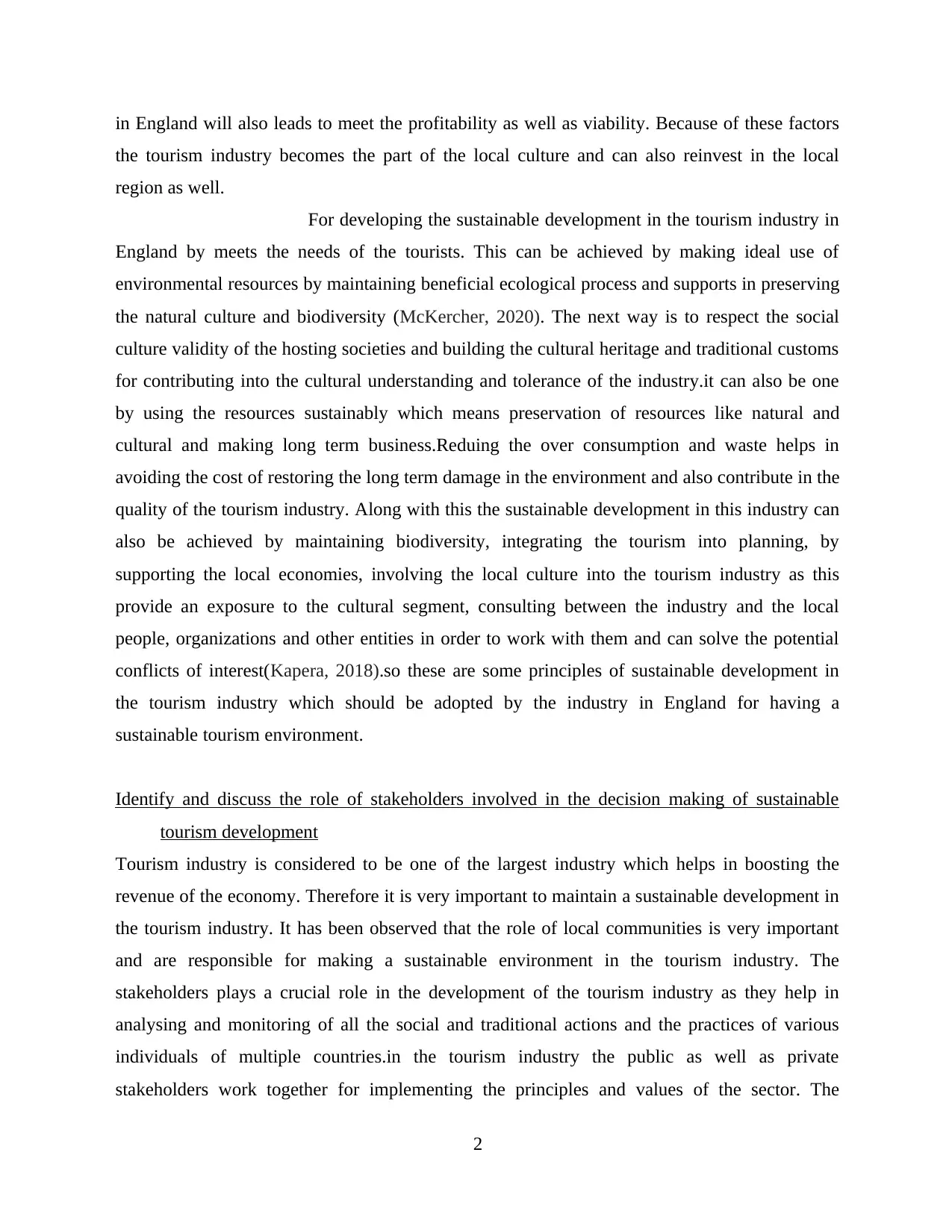
in England will also leads to meet the profitability as well as viability. Because of these factors
the tourism industry becomes the part of the local culture and can also reinvest in the local
region as well.
For developing the sustainable development in the tourism industry in
England by meets the needs of the tourists. This can be achieved by making ideal use of
environmental resources by maintaining beneficial ecological process and supports in preserving
the natural culture and biodiversity (McKercher, 2020). The next way is to respect the social
culture validity of the hosting societies and building the cultural heritage and traditional customs
for contributing into the cultural understanding and tolerance of the industry.it can also be one
by using the resources sustainably which means preservation of resources like natural and
cultural and making long term business.Reduing the over consumption and waste helps in
avoiding the cost of restoring the long term damage in the environment and also contribute in the
quality of the tourism industry. Along with this the sustainable development in this industry can
also be achieved by maintaining biodiversity, integrating the tourism into planning, by
supporting the local economies, involving the local culture into the tourism industry as this
provide an exposure to the cultural segment, consulting between the industry and the local
people, organizations and other entities in order to work with them and can solve the potential
conflicts of interest(Kapera, 2018).so these are some principles of sustainable development in
the tourism industry which should be adopted by the industry in England for having a
sustainable tourism environment.
Identify and discuss the role of stakeholders involved in the decision making of sustainable
tourism development
Tourism industry is considered to be one of the largest industry which helps in boosting the
revenue of the economy. Therefore it is very important to maintain a sustainable development in
the tourism industry. It has been observed that the role of local communities is very important
and are responsible for making a sustainable environment in the tourism industry. The
stakeholders plays a crucial role in the development of the tourism industry as they help in
analysing and monitoring of all the social and traditional actions and the practices of various
individuals of multiple countries.in the tourism industry the public as well as private
stakeholders work together for implementing the principles and values of the sector. The
2
the tourism industry becomes the part of the local culture and can also reinvest in the local
region as well.
For developing the sustainable development in the tourism industry in
England by meets the needs of the tourists. This can be achieved by making ideal use of
environmental resources by maintaining beneficial ecological process and supports in preserving
the natural culture and biodiversity (McKercher, 2020). The next way is to respect the social
culture validity of the hosting societies and building the cultural heritage and traditional customs
for contributing into the cultural understanding and tolerance of the industry.it can also be one
by using the resources sustainably which means preservation of resources like natural and
cultural and making long term business.Reduing the over consumption and waste helps in
avoiding the cost of restoring the long term damage in the environment and also contribute in the
quality of the tourism industry. Along with this the sustainable development in this industry can
also be achieved by maintaining biodiversity, integrating the tourism into planning, by
supporting the local economies, involving the local culture into the tourism industry as this
provide an exposure to the cultural segment, consulting between the industry and the local
people, organizations and other entities in order to work with them and can solve the potential
conflicts of interest(Kapera, 2018).so these are some principles of sustainable development in
the tourism industry which should be adopted by the industry in England for having a
sustainable tourism environment.
Identify and discuss the role of stakeholders involved in the decision making of sustainable
tourism development
Tourism industry is considered to be one of the largest industry which helps in boosting the
revenue of the economy. Therefore it is very important to maintain a sustainable development in
the tourism industry. It has been observed that the role of local communities is very important
and are responsible for making a sustainable environment in the tourism industry. The
stakeholders plays a crucial role in the development of the tourism industry as they help in
analysing and monitoring of all the social and traditional actions and the practices of various
individuals of multiple countries.in the tourism industry the public as well as private
stakeholders work together for implementing the principles and values of the sector. The
2
Paraphrase This Document
Need a fresh take? Get an instant paraphrase of this document with our AI Paraphraser
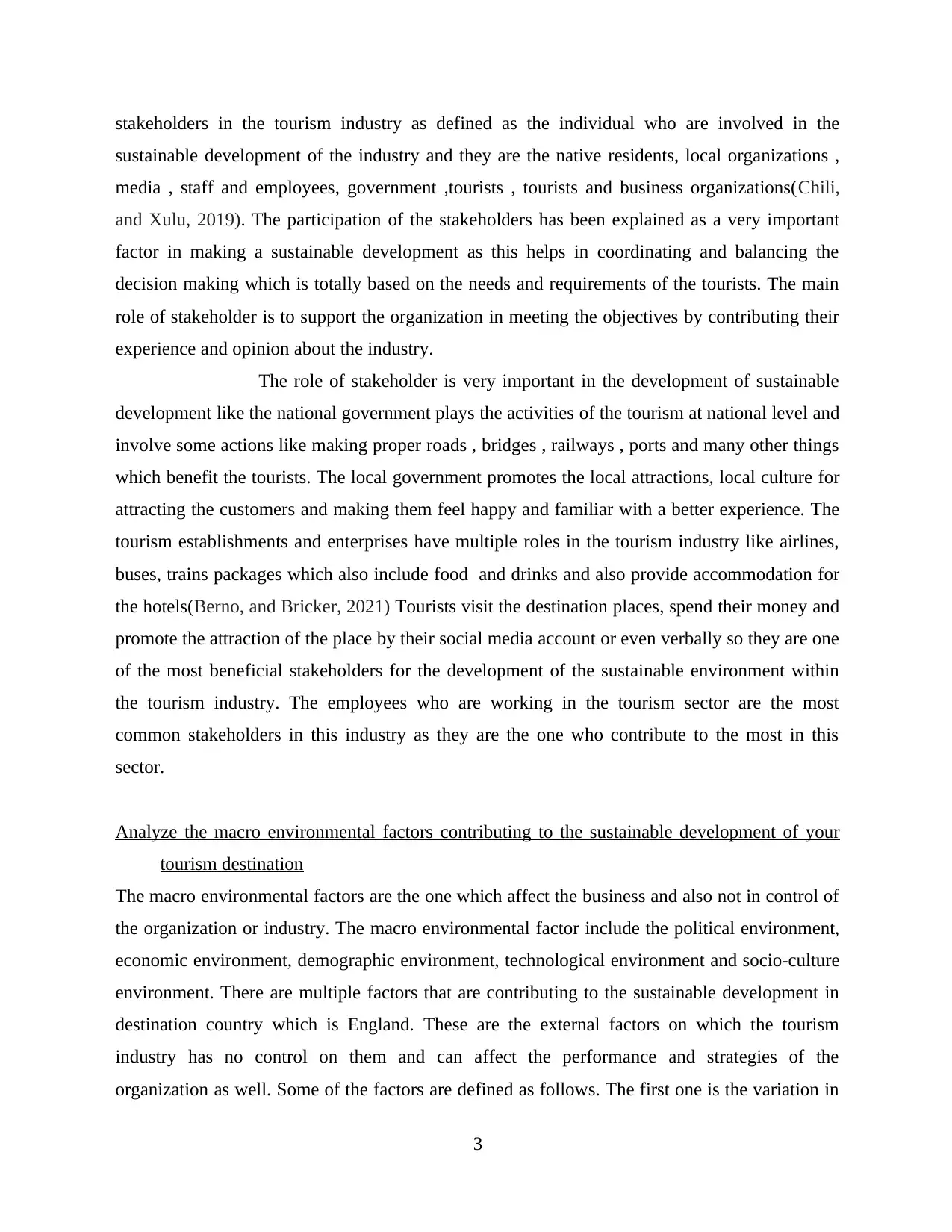
stakeholders in the tourism industry as defined as the individual who are involved in the
sustainable development of the industry and they are the native residents, local organizations ,
media , staff and employees, government ,tourists , tourists and business organizations(Chili,
and Xulu, 2019). The participation of the stakeholders has been explained as a very important
factor in making a sustainable development as this helps in coordinating and balancing the
decision making which is totally based on the needs and requirements of the tourists. The main
role of stakeholder is to support the organization in meeting the objectives by contributing their
experience and opinion about the industry.
The role of stakeholder is very important in the development of sustainable
development like the national government plays the activities of the tourism at national level and
involve some actions like making proper roads , bridges , railways , ports and many other things
which benefit the tourists. The local government promotes the local attractions, local culture for
attracting the customers and making them feel happy and familiar with a better experience. The
tourism establishments and enterprises have multiple roles in the tourism industry like airlines,
buses, trains packages which also include food and drinks and also provide accommodation for
the hotels(Berno, and Bricker, 2021) Tourists visit the destination places, spend their money and
promote the attraction of the place by their social media account or even verbally so they are one
of the most beneficial stakeholders for the development of the sustainable environment within
the tourism industry. The employees who are working in the tourism sector are the most
common stakeholders in this industry as they are the one who contribute to the most in this
sector.
Analyze the macro environmental factors contributing to the sustainable development of your
tourism destination
The macro environmental factors are the one which affect the business and also not in control of
the organization or industry. The macro environmental factor include the political environment,
economic environment, demographic environment, technological environment and socio-culture
environment. There are multiple factors that are contributing to the sustainable development in
destination country which is England. These are the external factors on which the tourism
industry has no control on them and can affect the performance and strategies of the
organization as well. Some of the factors are defined as follows. The first one is the variation in
3
sustainable development of the industry and they are the native residents, local organizations ,
media , staff and employees, government ,tourists , tourists and business organizations(Chili,
and Xulu, 2019). The participation of the stakeholders has been explained as a very important
factor in making a sustainable development as this helps in coordinating and balancing the
decision making which is totally based on the needs and requirements of the tourists. The main
role of stakeholder is to support the organization in meeting the objectives by contributing their
experience and opinion about the industry.
The role of stakeholder is very important in the development of sustainable
development like the national government plays the activities of the tourism at national level and
involve some actions like making proper roads , bridges , railways , ports and many other things
which benefit the tourists. The local government promotes the local attractions, local culture for
attracting the customers and making them feel happy and familiar with a better experience. The
tourism establishments and enterprises have multiple roles in the tourism industry like airlines,
buses, trains packages which also include food and drinks and also provide accommodation for
the hotels(Berno, and Bricker, 2021) Tourists visit the destination places, spend their money and
promote the attraction of the place by their social media account or even verbally so they are one
of the most beneficial stakeholders for the development of the sustainable environment within
the tourism industry. The employees who are working in the tourism sector are the most
common stakeholders in this industry as they are the one who contribute to the most in this
sector.
Analyze the macro environmental factors contributing to the sustainable development of your
tourism destination
The macro environmental factors are the one which affect the business and also not in control of
the organization or industry. The macro environmental factor include the political environment,
economic environment, demographic environment, technological environment and socio-culture
environment. There are multiple factors that are contributing to the sustainable development in
destination country which is England. These are the external factors on which the tourism
industry has no control on them and can affect the performance and strategies of the
organization as well. Some of the factors are defined as follows. The first one is the variation in
3
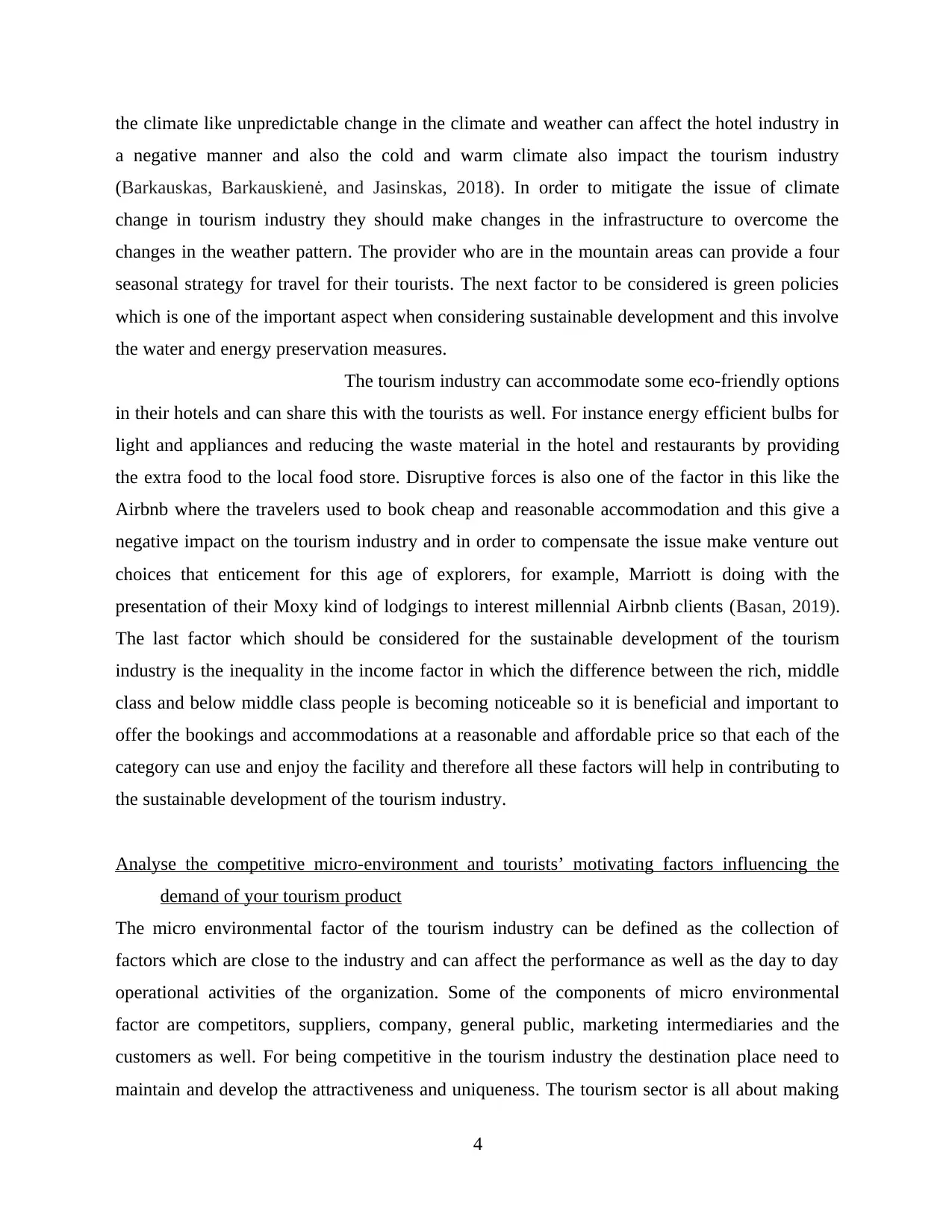
the climate like unpredictable change in the climate and weather can affect the hotel industry in
a negative manner and also the cold and warm climate also impact the tourism industry
(Barkauskas, Barkauskienė, and Jasinskas, 2018). In order to mitigate the issue of climate
change in tourism industry they should make changes in the infrastructure to overcome the
changes in the weather pattern. The provider who are in the mountain areas can provide a four
seasonal strategy for travel for their tourists. The next factor to be considered is green policies
which is one of the important aspect when considering sustainable development and this involve
the water and energy preservation measures.
The tourism industry can accommodate some eco-friendly options
in their hotels and can share this with the tourists as well. For instance energy efficient bulbs for
light and appliances and reducing the waste material in the hotel and restaurants by providing
the extra food to the local food store. Disruptive forces is also one of the factor in this like the
Airbnb where the travelers used to book cheap and reasonable accommodation and this give a
negative impact on the tourism industry and in order to compensate the issue make venture out
choices that enticement for this age of explorers, for example, Marriott is doing with the
presentation of their Moxy kind of lodgings to interest millennial Airbnb clients (Basan, 2019).
The last factor which should be considered for the sustainable development of the tourism
industry is the inequality in the income factor in which the difference between the rich, middle
class and below middle class people is becoming noticeable so it is beneficial and important to
offer the bookings and accommodations at a reasonable and affordable price so that each of the
category can use and enjoy the facility and therefore all these factors will help in contributing to
the sustainable development of the tourism industry.
Analyse the competitive micro-environment and tourists’ motivating factors influencing the
demand of your tourism product
The micro environmental factor of the tourism industry can be defined as the collection of
factors which are close to the industry and can affect the performance as well as the day to day
operational activities of the organization. Some of the components of micro environmental
factor are competitors, suppliers, company, general public, marketing intermediaries and the
customers as well. For being competitive in the tourism industry the destination place need to
maintain and develop the attractiveness and uniqueness. The tourism sector is all about making
4
a negative manner and also the cold and warm climate also impact the tourism industry
(Barkauskas, Barkauskienė, and Jasinskas, 2018). In order to mitigate the issue of climate
change in tourism industry they should make changes in the infrastructure to overcome the
changes in the weather pattern. The provider who are in the mountain areas can provide a four
seasonal strategy for travel for their tourists. The next factor to be considered is green policies
which is one of the important aspect when considering sustainable development and this involve
the water and energy preservation measures.
The tourism industry can accommodate some eco-friendly options
in their hotels and can share this with the tourists as well. For instance energy efficient bulbs for
light and appliances and reducing the waste material in the hotel and restaurants by providing
the extra food to the local food store. Disruptive forces is also one of the factor in this like the
Airbnb where the travelers used to book cheap and reasonable accommodation and this give a
negative impact on the tourism industry and in order to compensate the issue make venture out
choices that enticement for this age of explorers, for example, Marriott is doing with the
presentation of their Moxy kind of lodgings to interest millennial Airbnb clients (Basan, 2019).
The last factor which should be considered for the sustainable development of the tourism
industry is the inequality in the income factor in which the difference between the rich, middle
class and below middle class people is becoming noticeable so it is beneficial and important to
offer the bookings and accommodations at a reasonable and affordable price so that each of the
category can use and enjoy the facility and therefore all these factors will help in contributing to
the sustainable development of the tourism industry.
Analyse the competitive micro-environment and tourists’ motivating factors influencing the
demand of your tourism product
The micro environmental factor of the tourism industry can be defined as the collection of
factors which are close to the industry and can affect the performance as well as the day to day
operational activities of the organization. Some of the components of micro environmental
factor are competitors, suppliers, company, general public, marketing intermediaries and the
customers as well. For being competitive in the tourism industry the destination place need to
maintain and develop the attractiveness and uniqueness. The tourism sector is all about making
4
⊘ This is a preview!⊘
Do you want full access?
Subscribe today to unlock all pages.

Trusted by 1+ million students worldwide
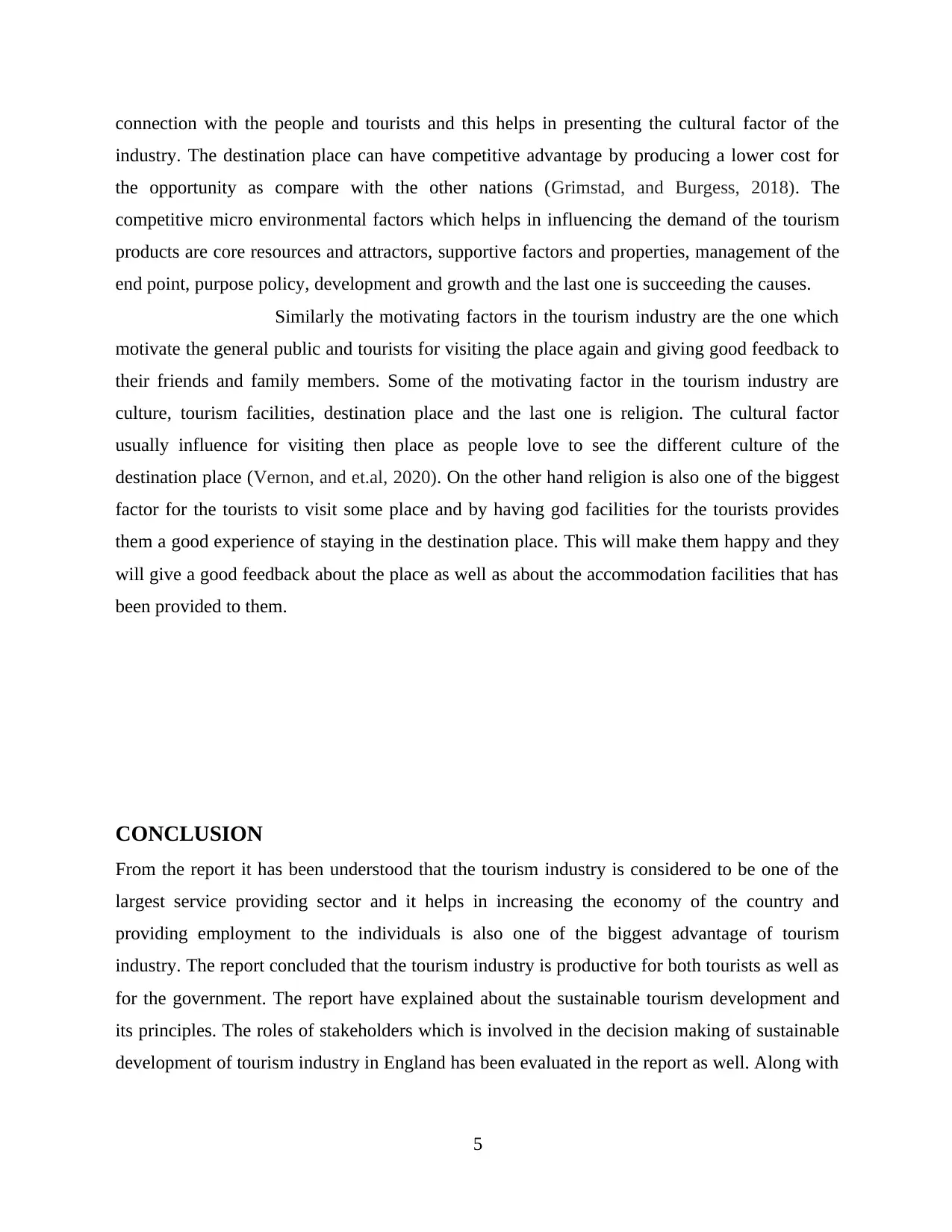
connection with the people and tourists and this helps in presenting the cultural factor of the
industry. The destination place can have competitive advantage by producing a lower cost for
the opportunity as compare with the other nations (Grimstad, and Burgess, 2018). The
competitive micro environmental factors which helps in influencing the demand of the tourism
products are core resources and attractors, supportive factors and properties, management of the
end point, purpose policy, development and growth and the last one is succeeding the causes.
Similarly the motivating factors in the tourism industry are the one which
motivate the general public and tourists for visiting the place again and giving good feedback to
their friends and family members. Some of the motivating factor in the tourism industry are
culture, tourism facilities, destination place and the last one is religion. The cultural factor
usually influence for visiting then place as people love to see the different culture of the
destination place (Vernon, and et.al, 2020). On the other hand religion is also one of the biggest
factor for the tourists to visit some place and by having god facilities for the tourists provides
them a good experience of staying in the destination place. This will make them happy and they
will give a good feedback about the place as well as about the accommodation facilities that has
been provided to them.
CONCLUSION
From the report it has been understood that the tourism industry is considered to be one of the
largest service providing sector and it helps in increasing the economy of the country and
providing employment to the individuals is also one of the biggest advantage of tourism
industry. The report concluded that the tourism industry is productive for both tourists as well as
for the government. The report have explained about the sustainable tourism development and
its principles. The roles of stakeholders which is involved in the decision making of sustainable
development of tourism industry in England has been evaluated in the report as well. Along with
5
industry. The destination place can have competitive advantage by producing a lower cost for
the opportunity as compare with the other nations (Grimstad, and Burgess, 2018). The
competitive micro environmental factors which helps in influencing the demand of the tourism
products are core resources and attractors, supportive factors and properties, management of the
end point, purpose policy, development and growth and the last one is succeeding the causes.
Similarly the motivating factors in the tourism industry are the one which
motivate the general public and tourists for visiting the place again and giving good feedback to
their friends and family members. Some of the motivating factor in the tourism industry are
culture, tourism facilities, destination place and the last one is religion. The cultural factor
usually influence for visiting then place as people love to see the different culture of the
destination place (Vernon, and et.al, 2020). On the other hand religion is also one of the biggest
factor for the tourists to visit some place and by having god facilities for the tourists provides
them a good experience of staying in the destination place. This will make them happy and they
will give a good feedback about the place as well as about the accommodation facilities that has
been provided to them.
CONCLUSION
From the report it has been understood that the tourism industry is considered to be one of the
largest service providing sector and it helps in increasing the economy of the country and
providing employment to the individuals is also one of the biggest advantage of tourism
industry. The report concluded that the tourism industry is productive for both tourists as well as
for the government. The report have explained about the sustainable tourism development and
its principles. The roles of stakeholders which is involved in the decision making of sustainable
development of tourism industry in England has been evaluated in the report as well. Along with
5
Paraphrase This Document
Need a fresh take? Get an instant paraphrase of this document with our AI Paraphraser
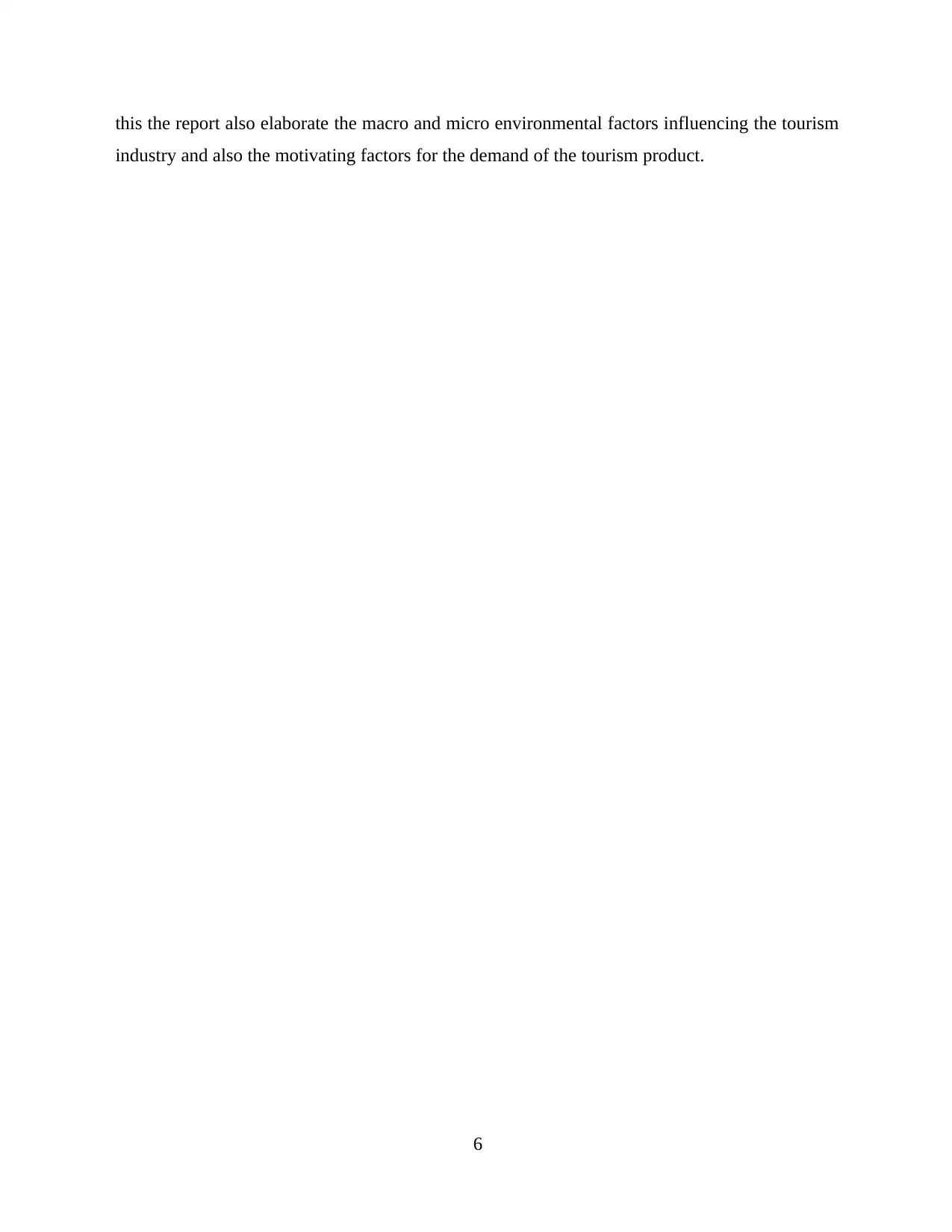
this the report also elaborate the macro and micro environmental factors influencing the tourism
industry and also the motivating factors for the demand of the tourism product.
6
industry and also the motivating factors for the demand of the tourism product.
6
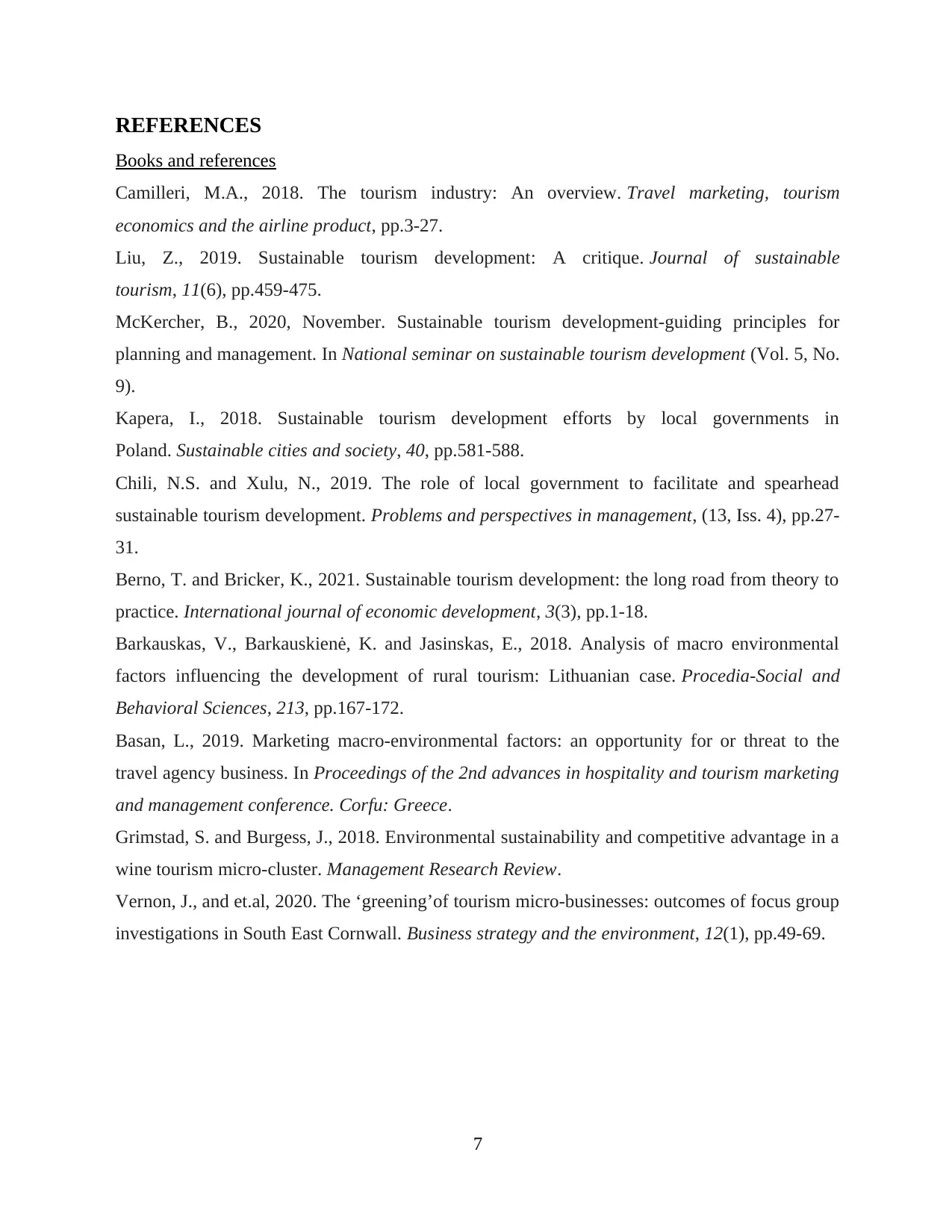
REFERENCES
Books and references
Camilleri, M.A., 2018. The tourism industry: An overview. Travel marketing, tourism
economics and the airline product, pp.3-27.
Liu, Z., 2019. Sustainable tourism development: A critique. Journal of sustainable
tourism, 11(6), pp.459-475.
McKercher, B., 2020, November. Sustainable tourism development-guiding principles for
planning and management. In National seminar on sustainable tourism development (Vol. 5, No.
9).
Kapera, I., 2018. Sustainable tourism development efforts by local governments in
Poland. Sustainable cities and society, 40, pp.581-588.
Chili, N.S. and Xulu, N., 2019. The role of local government to facilitate and spearhead
sustainable tourism development. Problems and perspectives in management, (13, Iss. 4), pp.27-
31.
Berno, T. and Bricker, K., 2021. Sustainable tourism development: the long road from theory to
practice. International journal of economic development, 3(3), pp.1-18.
Barkauskas, V., Barkauskienė, K. and Jasinskas, E., 2018. Analysis of macro environmental
factors influencing the development of rural tourism: Lithuanian case. Procedia-Social and
Behavioral Sciences, 213, pp.167-172.
Basan, L., 2019. Marketing macro-environmental factors: an opportunity for or threat to the
travel agency business. In Proceedings of the 2nd advances in hospitality and tourism marketing
and management conference. Corfu: Greece.
Grimstad, S. and Burgess, J., 2018. Environmental sustainability and competitive advantage in a
wine tourism micro-cluster. Management Research Review.
Vernon, J., and et.al, 2020. The ‘greening’of tourism micro‐businesses: outcomes of focus group
investigations in South East Cornwall. Business strategy and the environment, 12(1), pp.49-69.
7
Books and references
Camilleri, M.A., 2018. The tourism industry: An overview. Travel marketing, tourism
economics and the airline product, pp.3-27.
Liu, Z., 2019. Sustainable tourism development: A critique. Journal of sustainable
tourism, 11(6), pp.459-475.
McKercher, B., 2020, November. Sustainable tourism development-guiding principles for
planning and management. In National seminar on sustainable tourism development (Vol. 5, No.
9).
Kapera, I., 2018. Sustainable tourism development efforts by local governments in
Poland. Sustainable cities and society, 40, pp.581-588.
Chili, N.S. and Xulu, N., 2019. The role of local government to facilitate and spearhead
sustainable tourism development. Problems and perspectives in management, (13, Iss. 4), pp.27-
31.
Berno, T. and Bricker, K., 2021. Sustainable tourism development: the long road from theory to
practice. International journal of economic development, 3(3), pp.1-18.
Barkauskas, V., Barkauskienė, K. and Jasinskas, E., 2018. Analysis of macro environmental
factors influencing the development of rural tourism: Lithuanian case. Procedia-Social and
Behavioral Sciences, 213, pp.167-172.
Basan, L., 2019. Marketing macro-environmental factors: an opportunity for or threat to the
travel agency business. In Proceedings of the 2nd advances in hospitality and tourism marketing
and management conference. Corfu: Greece.
Grimstad, S. and Burgess, J., 2018. Environmental sustainability and competitive advantage in a
wine tourism micro-cluster. Management Research Review.
Vernon, J., and et.al, 2020. The ‘greening’of tourism micro‐businesses: outcomes of focus group
investigations in South East Cornwall. Business strategy and the environment, 12(1), pp.49-69.
7
⊘ This is a preview!⊘
Do you want full access?
Subscribe today to unlock all pages.

Trusted by 1+ million students worldwide
1 out of 9
Related Documents
Your All-in-One AI-Powered Toolkit for Academic Success.
+13062052269
info@desklib.com
Available 24*7 on WhatsApp / Email
![[object Object]](/_next/static/media/star-bottom.7253800d.svg)
Unlock your academic potential
Copyright © 2020–2026 A2Z Services. All Rights Reserved. Developed and managed by ZUCOL.




